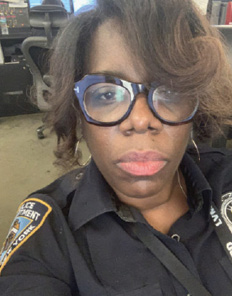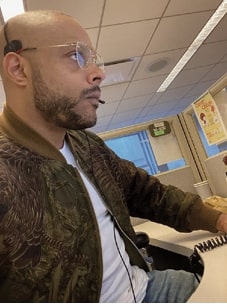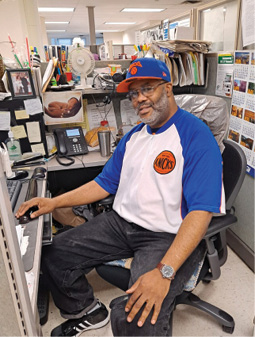Public Employee Press: PEP Talk
As NYC calls for urgent help, Local 1549 answers



By DIANE S. WILLIAMS
In the early weeks of the COVID-19 pandemic, 911 Operators, like many office workers, sat close together. There was no social distancing as they answered the onslaught of emergency calls. Then a lot of workers began to get sick. Some died.
Local 1549 President Eddie Rodriguez and Executive Vice President Alma Roper spoke with the NYPD commissioner. “Our message was urgent: Something has to be done to protect the safety and lives of these essential workers,” Roper said.
The union fought for personal protective equipment, but did not wait on management.
“We began distributing masks and hand sanitizer. We fought to get plexiglass dividers installed to separate the 911 PCTs and Supervising PCTs. We convinced management to have daily temperature readings for anyone required to report to worksites,” Roper said.
As essential workers, 911 Operators work around the clock every day at New York City’s two 911 call centers in the Bronx and at Metrotech in Brooklyn. These brave women and men are the first contact in an emergency. They link people in crisis to the life-saving help they need.
“The first voice on the line that you hear when you call in an emergency is the 911 Operator,” wrote Chrystle Bullock, a 911 Operator whose guest column first appeared on the DC 37 blog. “We are the first link in the chain to keep New Yorkers safe.”
Clerical-Administrative Employees Local 1549 represents 1,306 Police Communication Technicians and 174 Supervising Police Communication Technicians at NYPD 911 Call Centers; 259 Department of Information 311 Operators; and 2,127 Eligibility Specialists at the Human Resources Administration. They provide a vital safety net for New Yorkers, especially during this global health crisis.
As cases of COVID-19 spread in New York, 911 Operators — essential workers who cannot work remotely — answered the tsunami of emergency calls. During its peak, emergency calls to 911 increased by 40%. 911 Operators took as many calls each day as they did during the 2001 World Trade Center terrorist attack.
“Every day we go to work and leave our families, not knowing if we will contract this virus and get sick, or worse, bring it home. Many of us are single moms raising kids and are caregivers for our elderly parents while holding down New York City,” said Bullock, a 27-year NYPD veteran. “Every call is a coronavirus emergency where patients are experiencing the same symptoms of being deathly sick or unconscious.”
Rodriguez said as COVID-19 spread among NYPD precinct staff, Police Administrative Aides, and Senior PAAs and Clericals working at public hospitals and city agencies, dozens of city workers died, but just how many Local 1549 members succumbed to the disease cannot be confirmed. With DC 37 Executive Director Henry Garrido and Safety and Health Director Deborah Williams, Rodriguez and Roper spoke with city agency heads to stress the importance of implementing social distancing and other safety protocols to help protect workers during the pandemic. The union also negotiated to have non-essential staff work from home.
“There were a lot of pushbacks, but we insisted that members’ safety comes first,” Rodriguez said. “Early on, HRA management did not want staff to wear masks or gloves when interacting with clients,” said Felix Cooper, an Eligibility Specialist and Local 1549 Grievance Rep. For example, Cooper said he observed long lines and no distancing or safety protocols outside the Hunts Point HASA.
“There was practically no social distancing at an office that services HIV/AIDS clients whose immune systems are compromised,” Cooper said. “Management failed to screen clients the way they did us employees and relied on the honor system. We hear from them that if you are sick, stay home. But when essential workers call in sick, managers harass us.” Rodriguez said the union is holding virtual labor-management meetings to address the issue.
While some HRA Eligibility Specialists rotate office days, Rodriguez said others opt to come in daily. Justin Smith, an Eligibility Specialist and Local 1549 shop steward at a Queens HRA site, is part of a skeleton staff of about 10. He reviews and processes applications to determine if a person qualifies for public assistance programs.
“We are here to provide services to whoever needs it,” Smith said. “We’re not letting anything stop us from helping people. My job is to leave no one behind. I do the best of my ability to carry that out.”
Since March, call volume has increased significantly at NYPD 911, HRA, and 311 Call Centers. David Olmo, a 311 Operator said, “Since the pandemic, we get a high number of calls from elderly people who are home-bound and need food. Others need information on unemployment insurance. People are in arrears on their rent. We see a lot more people hurting and in need.
“The conditions the pandemic has put on people and businesses impacts the need for more information on government services, COVID-19 symptoms, testing sites, and other resources the City has developed,” Olmo said. “We are constantly changing to meet people’s needs in real time. People call 311, but sometimes they’re not sure what they need or what’s available. It’s my job to let them know. I ask the right questions to find out what their specific needs are so I can connect them to services. We’re equipped for high call volume and will probably see more as the pandemic resurges.”
To get NYPD 911 Operators officially designated as First Responders, Local 1549 leaders are lobbying federal and state lawmakers. Rodriguez said, “Our 911 Operators provide an invaluable service. They deserve First Responder status. They are here to save lives and help New Yorkers stay safe in emergencies!”


